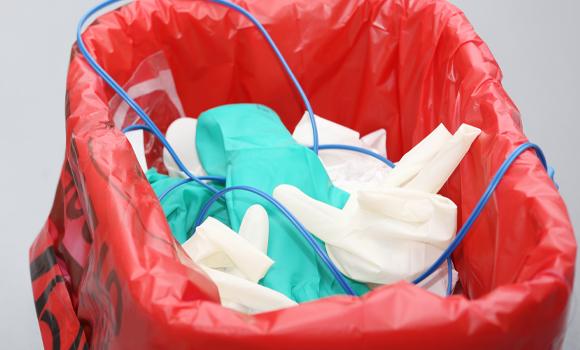The Significance of Proper Waste Disposal Practices
From the repercussions of inappropriate waste disposal on our environment to the long-lasting ramifications for future generations, the relevance of adopting lasting waste management techniques can not be overstated. By exploring the environmental effect of untrustworthy waste disposal, the advantages of recycling efforts, and the value of area engagement in waste reduction efforts, a much deeper understanding of why correct waste disposal practices are important emerges.
Environmental Effect of Improper Disposal
Inappropriate disposal of waste poses a significant hazard to the environment due to its detrimental impacts on ecological communities and human health and wellness. When waste is not properly handled, it can bring about contamination of the water, air, and soil, causing harm to various plant and animal species. click here. Chemicals and toxic substances from poorly disposed waste can permeate right into the ground, contaminating groundwater sources and impacting the wellness of both wild animals and human beings
Furthermore, the accumulation of waste in landfills produces greenhouse gases like methane, contributing to climate modification and international warming. Inappropriate disposal methods additionally cause littering, which not only weakens the visual value of the setting however can additionally damage wild animals via ingestion or complexity.
To mitigate these environmental influences, it is vital for neighborhoods and people to take on correct garbage disposal practices such as recycling, composting, and accountable dangerous waste disposal. By taking these steps, we can aid shield ecosystems, preserve natural resources, and secure human health and wellness for existing and future generations.
Advantages of Recycling Programs
Routinely participating in reusing programs supplies many benefits for both the setting and culture as a whole. This preservation of sources not only assists in keeping environmental balance but likewise contributes to lasting advancement.
Moreover, recycling plays an essential function in reducing energy intake and greenhouse gas emissions. The manufacturing of items from recycled materials normally calls for less energy contrasted to making from virgin resources - medical waste removal. Because of this, the carbon impact related to the production process is dramatically reduced, assisting in the battle against climate change
Additionally, reusing programs develop job chances in the reusing sector, advertising economic growth and social well-being. By urging the recycling and reuse of materials, these programs support a circular economic situation that decreases waste generation and maximizes resource effectiveness, inevitably leading to a cleaner, greener future for generations to find.
Hazardous Waste Administration Guidelines
Carrying out efficient contaminated materials monitoring standards is critical for minimizing environmental and health risks connected with the improper disposal of dangerous products - click here. Appropriate handling, treatment, and disposal of contaminated materials are important to prevent contamination of soil, water sources, and air
One secret guideline appertains labeling of contaminated materials containers to make sure secure handling and transport. Furthermore, facilities need to follow stringent storage requirements to stop leaks, spills, or mishaps that could endanger human health and the environment. Regular training programs for employees on hazardous waste monitoring techniques are additionally essential to make certain conformity with laws and promote a society of safety and security.
Furthermore, contaminated materials ought to be segregated based on its residential or commercial properties to stop chemical responses that can bring about go to website unsafe situations. Carrying out a detailed waste monitoring system can help monitor the movement of dangerous products from generation to disposal, ensuring transparency and accountability. By following these guidelines vigilantly, industries and organizations can add to a safer and cleaner setting for future and existing generations.
Neighborhood Involvement in Waste Reduction
To effectively address the ecological and health and wellness dangers related to contaminated materials monitoring, involving the area in waste reduction campaigns is critical. Area involvement plays a crucial function in advertising sustainable waste administration techniques and promoting a society of environmental obligation. By enlightening locals concerning appropriate waste partition, recycling, and composting methods, areas can substantially decrease the quantity of waste sent to land fills, consequently decreasing environmental air pollution and saving all-natural sources.
Area participation in waste reduction programs additionally aids in raising understanding concerning the relevance of waste minimization and motivates people to adopt environment-friendly routines in their day-to-days live - medical waste removal. Collaborative efforts between regional authorities, waste administration business, and neighborhood members can cause the application of reliable waste decrease approaches customized to the certain needs of each neighborhood or town
Moreover, community engagement fosters a sense of possession and liability amongst citizens, encouraging them to take aggressive actions in the direction of minimizing waste generation and promoting a cleaner, healthier environment for future and existing generations. By collaborating in the direction of usual waste decrease goals, communities can make a significant influence on minimizing the negative impacts of improper waste disposal techniques.

Future of Sustainable Waste Practices
The evolution of lasting waste techniques is important for progressing environmental stewardship and source preservation in the coming years. As the worldwide populace continues to grow, so does the amount of waste produced (medical waste removal). Typical waste disposal techniques, such as landfilling and incineration, are no more sustainable in the lengthy term due to their considerable ecological effects. Relocating forward, the future of lasting waste practices lies in welcoming a circular economic situation technique, where sources are recycled, recycled, or repurposed to decrease waste generation.
Technological advancements play a key function in forming the future of sustainable waste methods. Advanced waste sorting and recycling innovations can aid improve the effectiveness of waste administration processes, enabling the recuperation of useful sources from waste streams. Additionally, the adoption of biodegradable products and composting techniques can aid minimize the amount of organic waste ending up in land fills, thereby reducing greenhouse gas discharges.
Additionally, promoting customer understanding and education and learning on appropriate waste partition and disposal techniques is important for driving behavior modification towards sustainability. By cultivating a society of waste recycling, reuse, and decrease, communities can jointly add to a cleaner and healthier atmosphere for future generations.

Final Thought
In conclusion, correct garbage disposal methods are important for lessening ecological impact and advertising sustainability. By applying reusing programs, managing dangerous waste appropriately, and encouraging community participation in waste decrease efforts, we can function towards a cleaner and much healthier environment. It is necessary for organizations, federal governments, and individuals to prioritize lasting waste practices for the future well-being of our earth.

From the repercussions of improper waste disposal on our setting to the lasting implications for future generations, the importance of taking on sustainable waste management practices can not be overstated. By discovering the environmental effect of untrustworthy waste disposal, the benefits of reusing efforts, and the importance of community engagement in waste decrease initiatives, a much deeper understanding of why proper waste disposal techniques are vital arises.
By informing citizens concerning correct waste partition, reusing, and composting strategies, communities can considerably reduce the quantity of waste sent out to landfills, consequently minimizing ecological contamination and saving all-natural sources. (click here)
Relocating forward, the future of lasting waste methods exists in accepting a round economic situation approach, where sources are recycled, reused, or repurposed to minimize waste generation.
Advanced waste sorting and reusing innovations can assist enhance the performance of waste administration processes, allowing for the healing of beneficial sources from waste streams.